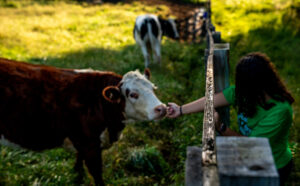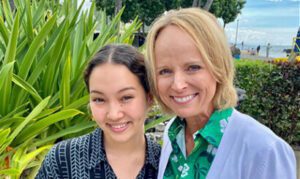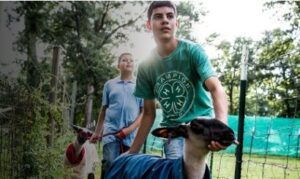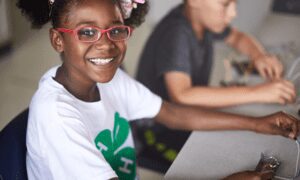Teki received her undergraduate degree at Spelman College, a historically black college for women. Although she did not attend an 1890 land-grant university*, she knew the value and impact that those institutions have on communities. Teki is now director of 4‑H Youth Programs, as well as co-program director of the Peace Corps Prep Program at the University of Arkansas Pine Bluff (UAPB).
Teki shared with me how her passion for early childhood development and special education led her to spearhead the development of the university’s 4‑H program.
Teki Hunt (TH): I started 4‑H in the second grade in 1981. In the lower grades, the focus was on arts and crafts. When I entered the 5th grade, I participated and competed in events at the county office, such as bicycle safety, BB gun shooting, archery, gardening, and cooking. I even won for the county and competed in the state bicycle safety competition.
What were some of the standout skills you learned in 4‑H, or what experiences did you have that helped build the foundation of where you are today?
TH: The one thing that stood out for me was the interactions I had with other people during contests and presentations. I was accustomed to getting up in front of people at church, but it was a different, unfamiliar audience in 4‑H. I needed to be confident and comfortable, no matter where I was or the audience to which I was presenting. We were encouraged to step outside the box and expand our worlds. I think 4‑H is still good at that!
Were there any influences growing up that led you to study child development in college – whether it was a person or an experience that you had?
TH: Initially, I wanted to pursue a career in pediatrics because I always liked working with kids, so I started pursuing a degree in pre-med. However, I switched to child development because I wanted to build an ongoing relationship with kids. After babysitting a child with down syndrome—my first babysitting job—I ended up studying and earning my master’s degree in special education at the University of Georgia (UGA). That experience was a turning point in my education and career.
What did it take for you to get to where you are today? Did you face any challenges as an African American woman in your profession or when pursuing your education? If so, how did you overcome those?
TH: Our community was mixed when I was growing up. My Mom worked at a hospital as a nurse, and my Dad is an attorney, so we always interacted with people from different backgrounds. It wasn’t until I went to graduate school that I was treated like I didn’t belong. UGA was integrated and had been for a while. When I was there, the students weren’t very accepting of me. I stuck it out, utilizing the graduate student support group and the multi-cultural center on campus. I also attended a local multi-cultural church, so I found places of acceptance.
After graduate school, I joined the Peace Corps, with the hopes of working with open-minded individuals who wanted to assist in developing countries. Unfortunately, I was the only Black in my cohort and experienced stereotyping, both in the training lessons and personally. I was even told I wasn’t American because of my skin color and how I blended in with the native Dominicans. Although speaking up didn’t help, after completing my training, I was readily accepted in the community where I served.
After college and the Peace Corps, what led you back to 4‑H to work with Cooperative Extension**?
TH: I returned to Arkansas to work in special education; I served in various early education centers that needed childhood special education services. The UAPB childcare center was one of the centers where I was assigned through the educational cooperative. In 2011, I was offered an adjunct position at the university to teach child development courses. Although I was hesitant, preferring to work with children under five, I accepted the opportunity and I liked the experience. Later, because I grew up in 4‑H, I was asked to help start the 4‑H program at UAPB. After helping co-advise the Collegiate 4‑H club, and earning the role of Assistant to the Dean, I was officially tasked with launching the 4‑H program. I was named the first Director of 4‑H Youth Development Programs at the university and learned the full scope of 4‑H through attending conferences and researching 4‑H programs in other states.
Can you talk a little bit about how 1890 land-grant universities and University of Arkansas Pine Bluff are continuing to open doors for African American students and youth, and expanding knowledge in communities?
TH: A lot of students don’t realize all the careers and opportunities that are available. However, when they attend a land-grant institution, they see the influence of USDA. We teach them the importance of agriculture and the science that powers it. We introduce students to their passion. We—and all historically black colleges and universities (HBCUs)—invest in the future success of our students. We want to make sure our students truly understand the value of our programs.
How do you think schools or other youth organizations, including 4‑H, can follow the example of the 1890s when it comes to encouraging more diversity and empowering young people to seek out more leadership roles?
TH: We need to encourage them at an early age, expose them to the career options available, and engage them when they’re still curious and open to new thoughts and experiences. It’s important to help kids recognize they have value and let them know that they can teach the teachers. We’re learning and growing together.
Where do you hope to see these kids in the future?
TH: I would love to see them engaged in a career that they love, giving back to their communities, and mentoring others like they were mentored in 4‑H. 4‑H and UAPB encourage kids and students to see beyond what’s in front of them and work with people who don’t look like them. I want them to spread their knowledge and understand the value in themselves and those around them. I hope they explore beyond their communities and bring back ideas that will make their communities, land-grant universities, and the world better.
*The Morrill Act of 1890 requires each state to show that race was not an admissions criterion, or else to designate a separate land-grant institution for persons of color. Among the seventy colleges and universities which eventually evolved from the Morrill Acts are several of today’s historically black colleges and universities (HBCUs).
**The Cooperative Extension System is a nationwide, non-credit educational network. Each U.S. state and territory has a state office at its land-grant university and a network of local or regional offices. These offices are staffed by experts who provide useful, practical, and research-based information to agricultural producers, small-business owners, youth, consumers, and others in rural areas and communities of all sizes.
















